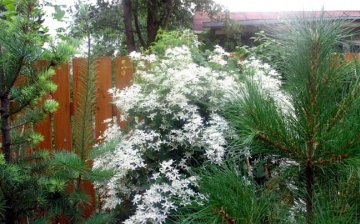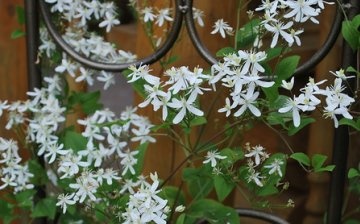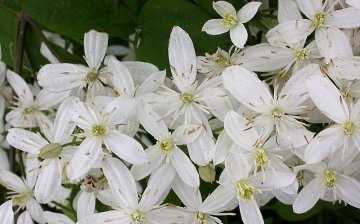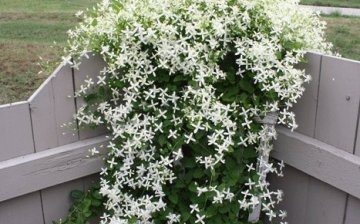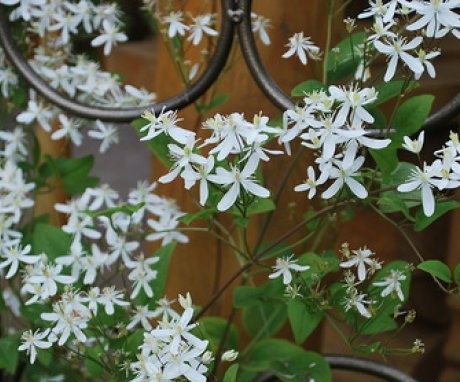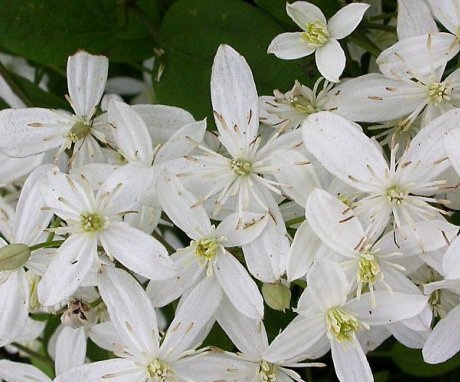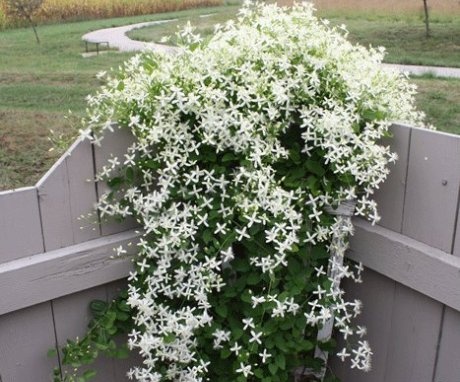Clematis Manchu
Clematis are vines, climbing plants that many gardeners would like to have on their site, in the garden, but not everyone succeeds in growing or preserving them. Many plant it incorrectly, others take care of it incorrectly, and still others acquire varieties that do not grow very well in our latitudes.
Content:
- Clematis Manchu: its features and characteristics
- Clematis Manchurian Care
- Cultivation of Manchurian clematis
Clematis Manchu: its features and characteristics
Clematis Manchurian is just the variety that suits our climatic conditions, since it is frost-resistant, it perfectly tolerates autumn and spring frosts, but also like all others varieties of clematis loves a sunny place. It can also be planted in partial shade, but a place well-lit by the sun is still preferable.
A positive feature of Manchurian clematis is also the fact that its shoots follow prune all at the onset of frost, since it blooms only on the shoots of the current year. This makes life easier for gardeners who are confused by the shoots of other clematis, in which only certain shoots need to be cut to a certain length.
Clematis Manchu blooms with small white flowers, but very profusely and at the peak of its flowering in June-July, it is a bush with a white cap of flowers that exudes a pleasant and strong aroma that you can feel even at a distance of ten meters from the plant. This clematis is completely unpretentious, belongs to direct clematis, its shoots reach one and a half meters in length.
Clematis Manchurian Care
Here are some aspects of caring for this plant:
- The soil
For clematis, the soil must be highly fertile (neutral or slightly alkaline).
- Location
Sunlight for clematis is needed in sufficient quantities. If the plant stops blooming, then, most likely, it is the lack of light that is the reason. Therefore, it is necessary to plant the plant in a place well-lit by the sun. It is also important that the plant is protected from wind gusts.
- Watering
Abundant watering - once a week. In case of extreme heat - up to 3 times a week. Watering must be done carefully so that no water gets on the flowers. Use a watering can without a nozzle.
- Top dressing
It is necessary only from the second year of the plant's life. A mineral fertilizer is suitable as a recharge (1 teaspoon of fertilizer in a hole to a depth of about 10 cm). You can also use organic and complex fertilizers and solutions. They must be brought in 1 or 2 times a month from May to early August.
- Mulching
A necessary procedure to keep the soil moist and cool. You can use pine bark and sawdust. It is necessary to mulch throughout the summer period.
- Diseases and pests
Powdery mildew, rust, gray rot, as well as aphids, slugs and spider mites - unfortunately, this is not a complete list of what can harm the plant. The help will be the early removal of infected areas of the plant and spraying with appropriate solutions (foundationol, copper-containing fungicides, insecticide, acaricide). If you have snails and slugs, arrange baits and collect them by hand.
An important part of plant care is weeding and weeding. A serious problem is nematodes, that is, root damage. The only thing that remains is the complete destruction of the plant.It is better not to plant anything in its place for the next few years.
Cultivation of Manchurian clematis
For the cultivation of Manchurian clematis, a strong and well-fixed support is used. For example, a wooden or metal batten, wire mesh, or string will work. In addition, clematis can be run on nearby bushes. Another option is to leave clematis unsupported. In this case, the plant will resemble a flowering carpet.
In the fall or spring, you need to purchase seedlings. Having chosen a suitable place, clematis must be planted so that its root collar is twenty centimeters below the soil level, and the pit itself should be about 60 * 60 * 60 cm.
Before planting, you need to pour a bucket of compost into the pit and mix it with the ground. The roots of the plant are carefully distributed, covered, watered and mulched. After the autumn pruning of shoots, it is better to cover it with leaves or spruce branches.
It is important to remember when planting clematis that there should not be any obstacles to growth near it, for example, concrete partitions or stones. In addition to the fact that this will interfere with the growth of the plant, because of such obstacles around the plant, the earth will heat up faster, and this is not very good for clematis.
Clematis are propagated by cuttings, layering and dividing the bush.
So, in order for clematis to become a real decoration of your garden, first choose the right variety of this plant. Clematis Manchu is the most suitable option. Caring for him is not so difficult, the main thing is to adhere to the basic recommendations for growing this beautiful plant.



